Month 11:22, Week 3:7 (Shibi'i/Sukkot), Year:Day 5955:316 AM
2Exodus 7/40
Gregorian Calendar: Wednesday 3 February 2021
Return of the
Elijah Prophets
II. Samuel the Seer, Balaam
& Deborah the Judge

Continued from Part 1
Introduction
Shabbat shalom kol beit Yisra'el and Mishpachah and welcome back to the second part of our series on the return of the Elijah Prophets. Last week we looked at a few examples of prophets and prophecy outside Israel in the pagan world and singled out the Kingdom of Mari in Mesopotamia for study as this is where the early Patriarchs, from Abraham to Jacob, had their roots. We underlined also the importance of placing Israel's nevi'im (prophets) within their own day primarily and to be very, very wary of looking for signs of prophecies pointing to our own day. They're there to be sure but they are very few, relatively speaking.
The Origin of Prophecy in Israel
Where did prophecy come from in Israel? Without going into the arguments advanced by theologians and historians with their different world views I will state right off that prophecy arose spontaneously in Israel just as it did elsewhere in pagan societies. The difference between the two was that Israelite prophecy emerged directly from Yahweh through the initiative and action of the Ruach (Spirit) whereas pagan philosophy emerged from the fallen fleshy or psychic nature of man. This has, in turn, always attracted demons given entry rights because of sin, who have then messed around with their hosts, sometimes giving them accurate (as we saw last week in the Story of Wen-Amon) but also giving them false prophecy.
Crossing the Israelite Frontier
That did not mean, of course, that the spirit of pagan prophecy remained outside the borders of Israel. It crossed the frontier by a variety of methods because the real frontier is human beings, not geography, and their intrusions depend on what people choose to believe and do. One thing the Israelite nevi'im (prophets) did not do, as liberals would accuse them, was to imitate pagan prophets unless some of their number apostacised, as we know many did, and got their 'education' in prophecy apart from Elohim (God). An Israelite didn't one day see a pagan prophesying and think to himself, 'Oh, that looks interesting, I think I'll give that a go! Now what was it he said and did...?' When prophecy first entered Israel Yahweh called a man for whom prophecy was the farthest from his mind and simply instructed him to act. That's how Abraham was called...right out of the blue and in his case, still a pagan with lots of re-education to be done.
When the First Israelite Prophets Grasped for Explanatory Language
So pagan ideas and forms entered the Israelite scene early on. That is one problem faced by the emerging theocratic confederacy of 12-tribed Israel and later in the united monarchic Kingdom of Israel starting with Saul, David and Solomon. The other problem, which can understandably confuse people, is that those early Israelites must inevitably have borrowed some of the terminology of prophetic language, to some degree, from the pagan Canaanites (whom they failed to completely extirpate from the land, you'll remember) because at first they had no vocabularly of their own with which to describe what they were experiencing.
Languages and Dialects Everywhere
Just move to another country, as I have done several times in my life, and observe how your vocabularly changes. Or change your denominational allegiance, as I have also done, and you will observe the same thing happening. Just becoming a messianic will see you dropping 'God' for 'Elohim', 'Lord' for 'Master', 'Jesus' for 'Yah'shua' or 'Yeshua' (or any number of variants), 'Jehovah' for 'Yahweh', 'church' for 'assembly', and so on. We change our language based on what we hear, use and read in our environment. Come to my home and you'll hear English (several forms), Norwegian, Swedish, smatterings of Malay, German, Italian, Hebrew, Greek and French spoken, and sometimes even Croatian and Slovenian! It takes quite an effort to become 'fluent' in the vocabularies and pronunciations of those who are around you. Moreover, we tend to 'tune in' to the language we like to hear the most and not 'hear' the other languages and dialects so well. So when I ask for the water at the dining room table you'll hear me use half a dozen words including Latin, Spanish and Italian! That comes from having visitors from all over the world here too. The Israelites in Canaan, because they failed to remove all the pagan natives as commanded (think of the Gibeonites who tricked Joshua and wormed a treaty of protection out of him, not forgetting the unconquered Philistines on the coast), faced similar language issues. They would have observed and heard their pagan prophets too, just as we do in a modern setting. All sorts of religious words entered our vocabulary in the 20th century alone like 'charismatic' and 'messianic' which have acquired meanings quite different from that spoken of in the Scriptures.
The Parenthetical Insertion of a Compiler
You may recall that last week I mentioned 1 Samuel 9:9 where the editor or redactor of that book wrote:
"(Formerly in Israel, when a man went to inquire of Elohim (God), he spoke thus: 'Come, let us go to the ro'eh (seer)'; for he who is now called a navi (prophet) was formerly called a ro'eh (seer))" (1 Sam.9:9, NKJV; Evidence Bible/EB, p.367).
As I said then, this is a parenthetical note by the compiler of the book, and was quite likely inserted during the Babylonian exile between 587 and 538 BC, which was about 500 years - or half a millennium - after the events being described. Language, customs and culture can change a lot in so long a period of time. That's the equivalent span of time between today and the Protestant Reformation when a form of English was spoken that few today would understand (unless that are conversant in King James English)! A brother once remarked to me how during World War II a Durch Christian decided to learn English by comparing his King James Version of the Bible (using 1611 English) with his Dutch one. At war's end, when he tried to communicate with English people, they couldn't understand him.
A Seer as One Who Understands
Now as one of you pointed out correctly last week, today a 'seer' (in English) is regarded as someone who supernaturally 'sees' revelations in visions. In Hebrew, like English, the word 'ro'eh' (seer, 'one who sees') is the participle of the word meaning 'to see'. And indeed, in the ordinary sense of the word, 3,000 years ago, a 'seer' would simply, on the one hand, have been someone able to 'see', someone who possesses sight, like all of us in this assembly. On the other hand, when we say that someone is able to 'see' we can also mean 'understand' as in, 'Oh, I see now!'. So in early Israel a 'seer' would simply have been someone who had 'understanding' - in other words, a 'wise man'. However, that's too simple because the ancient world was not 'secular' or 'naturalistic' as ours is. As in Africa today, the ancients regarded the invisible world as very much a 'natural', concrete reality, in the same way we regard the visible world here in Europe and North America.
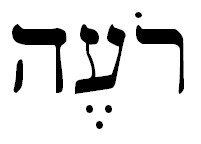 Ro'eh means 'seer' and 'wise man' and was the ancient
Ro'eh means 'seer' and 'wise man' and was the ancient
word for 'prophet' that also came to mean 'shepherd'
When the Natural and Supernatural Were One
Thus to call someone a 'ro'eh' would imply a wise man having understanding of both the visible and invisible realms, which would have been indistinguishable to the ancients, a meaning that is no longer a part of our usage of the word 'see' except in religious circles where the supernatural is acknowledged. The West has stopped believing in the supernatural for the most part. That is how your average man and women 3,000 years ago would have understood 'seeing' or 'seership', so someone able to understand both the natural and supernatural in a special way would have been called a 'seer', what in Africa is commonly called a 'man of God', an expression we don't use nearly as much in the West because we don't value the supernatural nearly as much as we ought. Thanks to the compiler of 1 Samuel, though, we know that 500 years later such a ro'eh or 'seer' had by then come to be called a 'navi' or 'prophet' and we need to know why.
A. Samuel the Seer & the Need to Constantly Update Language
Whoever compiled 1 Samuel started using the later terminology and yet you will find, in the first three chapters, Samuel is called a 'navi' or a 'prophet' (e.g. 1 Sam.3:20) for the benefit of later readers even though back in those days no such word as 'navi' or 'prophet' apparently existed. This does not mean the Bible has become corrupted - it simply means that 2,500 years ago, just like today, the language of the Bible has been updated to make it comprehensible to every new generation, something that 'King James Version-Onlyers' just don't get because they live in a make-believe world locked in the 17th century.
For Better and Worse
Of course, sometimes modern attempts to 'update' the language results (disasterously) in a loss of meaning but more often than not the meaning is given greater clarity, and that's why it's so important to know something about the evolution of language and study multiple Bible translations because some translators see things which others don't. In that respect, every English translation is actually a commentary of sorts. Like it or not, language changes, even between Genesis and Malachi. An example I cite a lot is the change in meaning of the word Torah which at the beginning meant 'law' exclusively but evolved to also mean 'teaching', 'doctrine' or 'instruction'. So when uninformed Protestants start claiming Christ abolished the 'Torah' or 'Law' what they usually don't understand is that they are accusing Yahweh of changing His teaching, doctrine or instruction too, which is palpitable nonsense, otherwise we wouldn't use the Tanakh (Old Testament) at all (as indeed a few Christians don't). And that's one way Paul gets misunderstood and how various heresies arise.
Good Bible Translations
So a good Bible translation will contain lots of scholarly footnotes explaning these things, a reason I use both conservative and liberal translations and commentaries to ensure any translator bias is erased in my own mind, because having to deal with a tension like that forces you to do serious research work. Even committee translations can be problematic because the concensus they reach more often than not reflects what their shared traditions expect. It really pleases me seeing Protestants, Catholics and Eastern Orthodox collaborating in Bible translations, which is now very common, but I will be happiest when they include some Messianic scholars too. (I don't expect it to happen any time soon because there really aren't that many messianic scholars around; the few I know - David Stern, Gabriel Roth, James Trimm and Phillip Goble - I have some issues with, and other messianic Bible translators like Moshe Koniuchowsky and Don Esposito are either not scholars or simply amateurs, respectively).
 Be very careful in your choice of Bible translations
Be very careful in your choice of Bible translations
More Than Once Source?
So why is Samuel called a navi in chapters 1-3 of 1 Samuel and a ro'eh (or 'man of God') in chapter 9? A very reasonable explanation (though it isn't necessarily the only one) is that this book has at least two sources which an editor has brought together. The insertion of the parenthetical note may then have had the extra purpose of reconciling the 'navi' and 'ro'eh' which shouldn't technically be together in the same chapter since in that day no one knew was a 'navi' was and it was not part of that early Hebrew vocabulary.
Making Scripture More Comprehensible
The same issue arises in the Hexateuch, so called (the Pentateuch or first 5 books of Moses - also, incidentally, called the 'Torah' - plus the Book of Joshua) where we find the word 'navi', and most often in Deuteronomy whereas only twice in Exodus and twice in Numbers but zero times in Leviticus. Why? If the parenthetical footnote in 1 Samuel 3:20 is accurate that can only mean that the whole Hexateuch has been edited for similar purposes - to make the Torah more comprehensible to later generations.
The Unknown Editors and Compilers
The question as to who did this, and when, is a matter of considerable speculation and has added fuel to the sceptics' machinations against the emet (truth) and this thanks largely to die-hard ultra-conservatives who insist that every single word of the Scriptures has been preserved from the very beginning when clearly this is not the case - you'll remember how the Masoretes tampered with messianic prophecies in the Tanakh (Old Testament) to 'protect' Jews from Christianity, for example. And remember nearly all English Bibles use the corrupted Masoretic text. The Masoretes aside, this doesn't mean those early changes are mailicious or an attempt to fabricate the original stories, as the naturalist sceptics insist, but rather is what one would expect of responsible teachers trying to make the text more understandable to successive generations. I could spend the whole sermon today talking about that but I don't think that would be very helpful so we'll leave that matter for now [1].
Lost Donkeys Lead to a Treasure House of Knowledge About Prophets
The important thing to understand is this. The early Seer in Israel was quite simply a person who knew secret or hidden things, and could reveal those things to others. Let's turn to 1 Samuel 9 (EB, p.367), where we learn that Saul's father, Kish, has lost his donkeys. We'll begin at verse 5:
"When they had come to the land of Zuph, Saul said to his servant who was with him, 'Come, let us return, lest my father cease caring about the donkeys and become worried about us.' And he said to him, 'Look now, there is in this city a man of Elohim (God), and he is an honourable (kavad) man; all that he says surely comes to pass. So let us go there; perhaps he can show us the way that we should go.' Then Saul said to his servant, 'But look, if we go, what shall we bring the man? For the bread in our vessels is all gone, and there is no present to bring to the man of Elohim (God). What do we have?' And the servant answered Saul again and said, 'Look, I have here at hand one fourth of a shekel of silver (about $8 in today's currency). I will give that to the man of Elohim (God), to tell us our way.' (Formerly in Israel, when a man went to inquire of Elohim (God), he spoke thus: 'Come, let us go to the ro'eh (seer)'; for he who is now called a navi (prophet) was formerly called a ro'eh (seer).) Then Saul said to his servant, 'Well said; come, let us go.' So they went to the city where the man of Elohim (God) was.
"As they went up the hill to the city, they met some young women going out to draw water, and said to them, 'Is the ro'eh (seer) here?' And they answered them and said, 'Yes, there he is, just ahead of you. Hurry now; for today he came to this city, because there is a sacrifice of the people today on the high place. As soon as you come into the city, you will surely find him before he goes up to the high place to eat. For the people will not eat until he comes, because he must bless the sacrifice; afterward those who are invited will eat. Now therefore, go up, for about this time you will find him"
"Now Yahweh had told Samuel in his ear the day before Saul came, saying, 'Tomorrow about this time I will send you a man from the land of Benjamin, and you shall anoint him commander over My people Israel, that he may save My people from the hand of the Philistines; for I have looked upon My people, because their cry has come to me.' And when Samuel saw Saul, Yahweh said to him, 'There he is, the man of whom I spoke to you. This one shall reign over My people.' Then Saul drew near to Samuel in the gate, and said, 'Please tell me, where is the ro'eh's (seer's) house?' And Samuel answered Saul and said, 'I am the ro'eh (seer). Go up before (ahead of) me to the high place, for you shall eat with me today; and tomorrow I will let you go and will tell you all that is in your heart. But as for your donkeys that were lost three days ago, do not be anxious about them, for they have been found. And on whom is all the desire of Israel? Is it not on you and on all your father's house?" (1 Sam.9:5-20, NKJV).
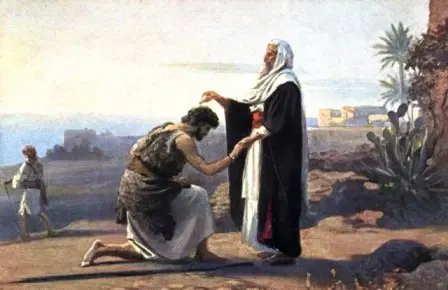 Saul was subsequently anointed first king of Israel by Samuel the Seer
Saul was subsequently anointed first king of Israel by Samuel the Seer
Six Revealing Facts About the Early Israelite Seer/Prophet
There are several important things about the early Israelite navi (prophets) that are taught here:
- 1. He was shown respect for his office and was referred to as a "man of Elohim (God)";
- 2. He was thus respected because he was "an honourable man" which translates the Hebrew word 'kavad' meaning 'heavy', 'weighty', 'sober' or 'serious-minded';
- 3. Whatever he prophesied, predicted or said "surely comes to pass";
- 4. The custom was to bring the Man of Elohim (God) food - in the absence of food, a present of some sort, in this case some money;
- 5. He was called a 'ro'eh' or 'seer' by Saul which Samuel himself acknowledged; and
- 6. He acted, seemingly, in some sort of priestly capacity even though he was from the tribe of Ephraim and not Levi.
Tithing for the Moedim
There is no evidence that Saul ever gave the intended present of a quarter of a shekel of silver but rather the ro'eh (seer) shared his meal with Saul and his company. That Saul thought to honour him in such a way, presumably because of etiquette, should not surprise us. The notion that visitors of gatherings where the Festivals of Yahweh are held bring food and/or some sort of monetary contribution is build into Yahweh's tithing system. Indeed those who practice tithing today have largely forgotten that only a third of the Tithe is to be used for the ministry (not a whole tenth), another third for the poor and the final third for the festivals [2]. Anciently tithing was usually paid in kind which in an agricultural society like Israel's usually meant food but it could also be paid in money at a special set exchange rate. This is what we are seeing here suggesting, perhaps, that using some of tithe might be used to go and consult with a navi or ro'eh (prophet/seer) like Samuel if that is what Yahweh has commanded you to do. Saul had run out of food because of his long search so only had money to offer Samuel.
Paying for Prophecy?
Today, in many countries around the world like India, for example, when you visit someone you are expected to bring a present, so this is not a case of there being a 'paid ministry' as some are wont to say in order to justify having a salary. We know the Levites were provided for from the tithes and perhaps that is how Samuel was supported too, though in those wild days I doubt that was organised too well. We'll discuss this again another day. At the most, one can say that if you are going to 'turn up' at a prophet's residence for a service you should at least make a contribution of some sort, not to 'buy' a prophecy but to contribute to the navi's (prophet's) table in some way if you're planning to stay with him. And the host can, of course, refuse as apparently Samuel did here. The Davar Elohim or Word of God is NOT, in any case, FOR SALE so the claim by liberals that the early prophets were salaried - though that may have been true in pagan countries - was not generally so in Israel and is bunkum, though in the monarchy kings sometimes had 'court prophets' whose physical needs they met in order to have them around all the time advising them. The liberals argue that the early 'paid seers' were replaced later by 'unpaid prophets' with frankly no concrete evidence to back that up. So the 'health and wealth' Prosperity Preachers and 'Prophets' will find no justification here for being paid for their prophecies (which are usually false anyway or so vague as to mean virtually anything you want).
Was Samuel an Ephraimite or Levite?
And yet there seems, at first glance, to be at least one 'odd' thing going on here, 'odd' when compared with the later nevi'im (prophets). Even later, when Saul became king, sacrificial feasts could not begin until the ro'eh (seer) Samuel had blessed the sacrifices. How come? Was Samuel not the son of "Elkanah the son of Jeroham, the son of Elihu, the son of Tohu, the son of Zuph, an Ephraimite" (1 Sam 1:1, NKJV)?. When Saul, who was a Benjamite, would later offer a sacrifice without Samuel it cost him his kingdom (1 Sam.13), so clearly Samuel had some sort of priestly authority, but what exactly? Did he not, after all, minister in the Sanctuary when Eli was Cohen Gadol (High Priest), something only Levites were allowed to do? And does it not say specifically in 1 Samuel 7:9 that he took a suckling lamb and offered it to Yahweh? And did not Yahweh acknowledge the sacrifice? Does this mean, as some have suggested, that he was part Ephraimite and part Levite? Yet the Torah teaches that if the father is of tribe A and the mother is of tribe B, the children are all of tribe A, which would make Samuel an Ephraimite because of his great great great grandfather Zuph. Even if his mother, grandmother, and all the other female side had all been Levites (highly unlikely as mostly people married within their tribe) that would still not make him legally a Levite even if he had 90 per cent Levitical blood in him and only 10 percent Ephraimite because of a distant ancestor? Israelite inheritance is patrilineal and not matrilineal as in modern Judaism, one of many areas where Judaism is out-of-the-way as far as the ancient Yahwist faith of the Tanakh (Old Testament) is concerned. That's the way Yahweh has set it up and we cannot argue with it. So even if Samuel had been only one per cent Ephraimite he was still an Ephraimite as far as the Sanctuary was concerned.
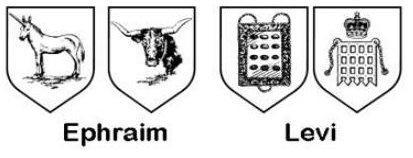
Two Possible Explanations
Yet we know that Samuel was directly associated with worship at the sanctuary or (in this particular location, a "high place") and that the sacrificial feast could not begin without his blessing (v.12) and that later he would specifically offer up a lamb himself. That is why there can be no doubt that Samuel the ro'eh (seer) was in some way exercising priestly functions not unlike the baru of the Mari texts and, more generally, the 'diviners' of the ancient Near East. That is not, of course, to say that the early Israelite ro'eh (seer) was identical to the pagan 'diviner' or 'soothsayer' mentioned in the Tanakh (Old Testament) because the latter is given a different Hebrew word altogether [3] and is usually condemned by the nevi'im (Is.3:3). Yet his rôle, they say, is similar. How do we explain an Ephraimite acting in a priestly capacity? There are really only two possibile explanations:
- 1. With all the chaos at the end of the period of the judges when "all the people did what was right in their own eyes" (Judg.21:25, NRSV) and the Levites were pretty much doing their own thing and behaving like pagans (Judg.17-20), the Levitical Priesthood may not really have been functioning at all and seriously needed reformation after a period of apostacy and darkness, so Yahweh had to use the only godly man who was fit for the job. I mean, Eli the Cohen Cadol (High Priest) was pretty liberal and certainly lax with his sons who were using their position to seduce women, turning the House of Yahweh into a whore house; and/or
- 2. Samuel was acting in some Melchizedek Priesthood capacity (which transcends tribal boundaries), as apparently King David, who was of the non-priestly House of Judah, did too, perhaps as a foreshadowing of Messiah, Himself of Judah, who inaugurated the New Covenant Melchizedek Priesthood and was its Cohen Gadol or High Priest. Thus if a Judahite could hold the Melchizedek Priesthood so, we must assume, could any tribal member. The King of Salem held it in Abraham's day and he wasn't of any Israelite tribe because Israel didn't yet exist.
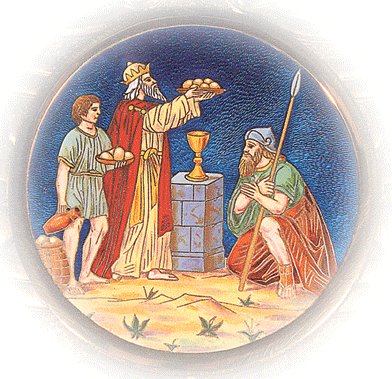 Melchizedek, King of Salem, Pre-Israelite Priesthood Holder
Melchizedek, King of Salem, Pre-Israelite Priesthood Holder
Degradation of the Levitical Priesthood
Whatever one finally concludes, there is no doubt that Samuel was a godly man of the highest calliber, possessed an extraordinary authority in his time and that he exercised it in some sort of priestly capacity. I cannot give you a concrete explanation. All I do know is that Yahweh vindicated Samuel over and over again, and did incredible things through him, including re-instituting a great Pesach (Passover) celebration after generations of apostacy that was remembered still in Josiah's day (2 Chr.35:18). My current belief is that both propositions I made are somehow true remembering that the Levtical system was only ever a temporary one until the coming of Messiah. Israel was starting to recover from a period of anarchy and lawlessness in which the Levites had not only abandoned their Priesthood but had clearly adopted pagan ways. Wealthy Israelites were even hiring priests:
"A young Levite from Bethlehem in Judah, who had been living within the clan of Judah, left that town in search of some other place to stay. On his way he came to Micah's house in the hill country of Ephraim. Micah asked him, 'Where are you from?' 'I'm a Levite from Bethlehem in Judah,' he said, 'and I'm looking for a place to stay.' Then Micah said to him, 'Live with me and be my father and cohen (priest), and I'll give you ten shekels of silver a year, your clothes and your food.' So the Levite agreed to live with him, and the young man was to him like one of his sons. Then Micah installed the Levite, and the young man became his cohen (priest) and lived in his house. And Micah said, 'Now I know that Yahweh will be good to me, since this Levite has become my priest'" (Judg 17:7-13, NIV).
The Private Minister of the Wealthy
Later, when some Danites, dissatisfied with their inheritance in unconquered Philistine territory, came by asking for a prophetic word concerning an expedition they were planning in the north to find a new home, the Levite confirms that Micah "has hired me and I am his cohen (priest)" (Judg.18:4, NIV). So the Levite, as a regular minister, was expected to act in a prophetic capacity as well as carry out his normal sacerdotal duties. This reminds us a bit of how in the mediaeval period of Europe wealthy and usually titled landowners frequently built chapels on their estates and hired their own priests to serve in them. There's no monarchy at this time of the judges, Israel is a confederacy of tribes, cohenim (priests) seem to be out for hire and wandering around just as Samuel the Seer (Ro'eh) was but in a wholly righteous way. Perhaps he is simply an exception to the rule (something, I know, that upsets the ultra-legalists) because there was no one else who was qualified, as we shall see in two more examples in just a minute. No one can doubt, though, that Yahweh used Samuel most effectively.
B. The Story of Balaam the Pagan Seer
Last week I mentioned Balaam to you and we must return to him once more as there is much of use to be harvested from that episode in Israelite history. So let's go back in time from Samuel's day to the time of the Exodus. Balaam is described as a ro'eh or 'seer' in Numbers 22-24 which contains some very peculiar stories indeed. To refresh your memories, Balak, the king of Moab, sent Balaam to curse Israel, who left (no doubt happily) with "the fee for divination" (Num.22:7, NIV). However, much to his own surprise, Balaam received a message from the Elohim (God) of Israel telling him that he could not curse what Yahweh had blessed. Not only that but on his way back Balaam saw a vision - as a 'seer' - in the sense which we today understand that word. Balaam sees a malak (angel) confronting the ass on which he was riding and once again he was instructed that he could only say what Yahweh had told him to say, not what the Moabite king had handsomely paid him to say.
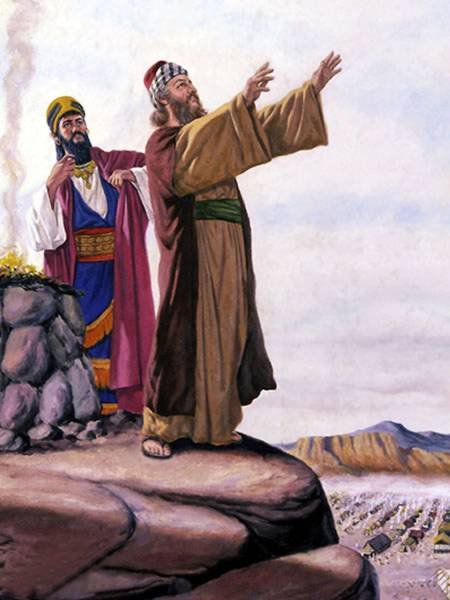 A horrified Moabite king watches Balaam the Seer Bless Israel
A horrified Moabite king watches Balaam the Seer Bless Israel
A Divine Gift Being Used in the Service of Evil
There are several things we learn from this curious yet very interesting incident which we must mentally jot down as we build up our knowledge-base on prophets and prophecy:
- 1. Balaam, though a pagan, clearly has some sort of prophetic gift but is using it in the service of the Enemy until Yahweh intervenes and compells him to speak His words; and
- 2. Occult-type pagan divinations and charms were powerless against Israel once Yahweh had blessed her.
The Poetic Prophecy of Balaam
As we move further along to chapter 24 and verse 16 in Numbers we are told that this Balaam saw visions and heard the Davar Elohim (Word of God) which he could not deny - notice that his revelation is given in poetic form:
"The oracle of Balaam son of Beor,
the oracle of one whose eye sees clearly,
the oracle of one who hears the words of Elohim (God),
who has knowledge from the Most High (Elyon),
who sees a vision from the Almighty (Shaddai),
who falls prostrate, and whose eyes are opened:
"I see him, but not now;
I behold him, but not near.
A star will come out of Jacob;
a scepter will rise out of Israel.
He will crush the foreheads of Moab,
the skulls of all the sons of Sheth.
Edom will be conquered;
Seir, his enemy, will be conquered,
but Israel will grow strong.
A ruler will come out of Jacob
and destroy the survivors of the city"
(Num.24:15-19, NIV).
All of which, incidentally, was fulfilled in the fullness of time.
Unrepentant False Prophets Rarely Used More Than Once by Yahweh
This could be a portion right out of the writings of an Isaiah or a Jeremiah! In verse 16 this pagan ro'eh or seer is described as one who sees visions and hears the Davar Elohim (Word of God) which he cannot deny. He is clearly able to hear both but chooses Satan until forced to do otherwise. And so, inspired or directed by compulsion by the Ruach (Spirit) of Yahweh, this pagan, who is familiar with the unseen world, utters the very words of Heaven...once, and once only. Yahweh used him for one, and only one, reason, as the Deuteronomist records in speaking later of Israel: "Nevertheless Yahweh your Elohim (God) would not listen to Balaam, but Yahweh your Elohim (God) turned the curse into a blessing for you, because Yahweh your Elohim (God) loves you" (Deut.23:5, NKJV). Thus in this text Balaam is presented as a 'seer', a cultic person who practices divination and utters curses. But on this occasion he feels himself under divine constraint as Yahweh bursts into the darkness of his counterfeit light-filled pagan world and causes the Davar Elohim (Word of God) to be spoken through his mouth.
The Elohim of History
This is, of course, the exception and not the rule - Yahweh doesn't ordinarily go around speaking through false prophets by means of the Ruach haQodesh (Holy Spirit) in other religions, at least not ones that don't repent, and Balaam did not repent but turned on Israel later and was killed for his crimes. Here we have a case of Yahweh's sovereign intervention, out of grace (undeserved loving kindness), because Balaam's negative action, had it had a chance of succeeding, would have changed history in a direction contrary to Yahweh's will. At best Balaam could have caused some short-term grief. And whilst Yahweh recognises individual's free agency, He reserves the right to determine the courses of nations, and particularly His chosen one, Israel. That's one point that needs to be underlined. Read the Book of Revelation, and especially verses 18 and 19 of the very last chapter, if you have any doubts about that. Historical outcomes are determined by Elohim (God) no matter what choices individuals may make and sometimes must sabotage their private plans to ensure that happens. The second point is that we see the rôles of 'prophet' (navi) and 'seer' (ro'eh), as we currently understand those terms, operating side by side.
The Chazah Seers
But there is more to the ro'eh or 'seer' than meets the eye (excuse the pun). There is a second Hebrew word which may also be translated 'seer' that is derived from the verb chazah which tends to indicate seeing a vision as well as seeing literally with the eyes, in other words, seeing a vision with your eyes wide open - an 'open vision', not a prophetic dream or something inbetween when you're half awake or half asleep. This word, which we also translate "seer" in English, is applied "to the prophet (navi) Gad, David's seer (choseh)" (2 Sam.24:11, NKJV). Here the words 'prophet' and 'seer' are used synonymously. In other words - and this is most important for those who may think they are 'prophets' today - at some point all three words, ro'eh, chozeh and navi, could be used to describe the same kind of person.
 The Chazah Seer sees visions with open eyes
The Chazah Seer sees visions with open eyes
A Prophetic Experience With My Dog
For such a person, the line dividing the seen and the unseen, the natural and the supernatural, is very thin indeed, and he is able to move back and forth between the two with ease (since he lives consciously in both) and can 'see' or 'understand' the relationship between the two. I speak as one who experiences this a lot. To give you an illustration, three nights ago I was awakened and could both feel and see one of my dogs, Chloë. She was right up against my face (even though she was in a different part of the house at the time) and I could both see and sense she was having difficulties. I immediately prayed for her, left her in Yahweh's hands, and returned to sleep. The next morning my wife told me that the dog had been in great distress during the night and had cuddled up close to her all night, something she does not normally do, preferring to sleep in her own bed on her own. I knew she had hurt her foot the day before so it was a relief the next day to see that she had improved somewhat. I have had thousands of experiences like that throughout my life both before but mostly after I became a believer and have learned, I hope, to exercise the gift the way Yahweh wants. That was an instance of knowing what was happening at the same moment of time as it was happening (sometimes there can be periods of time inbetween from minutes to hours) but I have seen both in the past and the future too. But I only share in public what Yahweh allows and most of the time I keep quiet.
Prophets Must Be Silent Most of the Time
I know there are those who think such a gift must be great 'fun' and envy those who possess it but I do assure you it is a heavy responsibility to carry and there have often been times I have absolutely not wanted it and just wanted to be like 'ordinary' people. This is because it grieves me to see what some people are going to choose in the future as well as knowing that what I share with most people will be rejected. In the early days of exercising this gift people would pester me for 'inside information', as it were, and once, in exasperation, I made the mistake of giving a very persistent lady what she wanted to hear just to get her off my back so I could get some sleep. What Yahweh said was not good, that she would abandon her faith because she loved her disobedient husband more than Yahweh, and that she subsequently did. She also lost her husband, sad to say, leaving her a single mother to raise her daughter alone.
Balaam's Final Act of Idolatry
So this is a gifting from Yahweh that is typically used whether the recipient is faithful to his calling or prostitutes it in the service of the Enemy, knowingly or unknowingly. I know another woman who used her prophetic gift, after she abandoned Yahweh and turned to the occult, to give her the upper hand in gambling on at least one occasion. I don't how all of that ended up, mind you, but such never ends well. I could tell you many other stories. But we are speaking now of Balaam who is a unique case of one who was 'born and raised' a pagan, who used the gift to serve pagan ends, was intercepted by Yahweh against his will, did as he was told on that one occasion, and then returned to his paganism and subsequently tried to destroy the very people he had originally blessed under divine compulsion by leading them to briefly worship the Moabite gods and fall into sexual sin. That business resulted in a plague that claimed 24,000 lives. Remember that in the days ahead. What a fool Balaam was...and, most importantly, how dangerous it is is exercise of the gift falsely. But the greater fools were the Israelites who listened to, and believed, him.
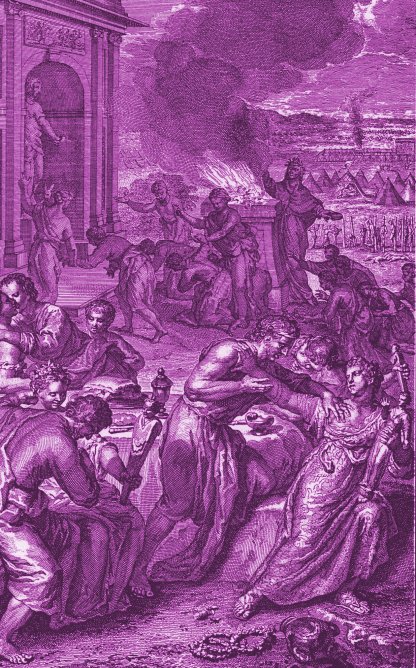 The sin of Baal-Peor
The sin of Baal-Peor
C. Deborah the Ro'eh & Third Judge of Israel
To finish today, let's return to those 'days of chaos' which was the time of the Judges because there we find another curious example of a 'prophet', or to be more exact, a 'prophetess' or a neviah. I am speaking, of course, of Deborah (Judg.4-5) whose name (Devorah) in the Hebrew means 'honey bee' which is perhaps a clue as to what kind of woman she was. As you examine the text carefully it is really hard to see what kind of activity she engaged which would earn her that particular title. The fact that she used to sit under a palm tree and people would come to her for judgment sounds more like the female equivalent of the original 'ro'eh', 'seer' or (in her case) a 'wise woman'. Indeed, it has been suggested, with some justification, like those parts of 1 Samuel we have already examined, that we can see the hand of an editor, compiler or redactor again, from the monarchic period. The language is archaic.
Did Deborah Prophesy Anything?
You see, there is no evidence that Deborah ever predicted, foretold or prophesied anything, though that's not to say she didn't, but the fact she is numbered amongst the succession of Judges of the Israelite Confederacy (the third of 12 in all, Samuel being the last) does strongly suggest she had to step into a leadership position because none of the men in her day were up to the job. That makes her both an exception and exceptional, if you know what I mean. Moreover, she was not specifically called by Yahweh to be a judge, but then neither were six of the other twelve judges. Only Othniel (Judg.3:9), Ehud (Judg.3:15), Gideon (Judg.6:14), Jephthah (Judg.11:19), Samson (Judg.13:24-25) and Samuel are recorded as being specifically called. In chaotic times, natural leaders just 'arise', as it were.
Deborah, Jael and Judith
That she was involved directing some decisive battles against the Canaanites under the command of her general, Barak, suggests she was both a fiery woman as well as possessing a fanatical zeal for Yahweh, if the Song of Deborah in Judges 5 is anything to go by, and it is perhaps the latter quality which earned her the title of neviah or 'prophetess', even though both she and Barak sang it though she was clearly its author (e.g. v.7). There are those who think the story of another fiery woman called Jael, who hammered a giant nail into the head of the Canaanite commander Sisera, which Deborah recalls in her Song, inspired the apocryphal figure of Judith in the book of the same name, the woman who chopped off the head of another enemy commander, Holofernes. Indeed, not, as it were, to be outdone by Miriam and Jael, Judith sings a lengthy hymn of praise herself (Judith 16:14-17) to round of a prophetically-sounding prayer too (Judith 9:1-14). Judith is, however, more than likely a Pharisee invention and shows clear evidence of having been written in the Helenistic era, i.e. between 135-78 BC, when a lot of apocryphal and pseudigraphical works appeared of dubious inspiration.
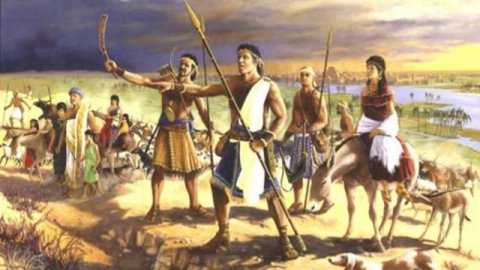 Deborah with her general, Barak
Deborah with her general, Barak
A Mother in Israel
Notice that in the Song of Deborah that she calls herself "a mother in Israel" (Judg.5:7, NRSV). That does not necessarily mean she had a family, though she may very well have had one. The reason she says that, some feminist liberals insist, is to make a claim to being a 'prophetess'. Why? Because later, in the days of the divided monarchies, both Elijah and Elisha were called "father" by Elisha (2 Ki.2:12) and by King Joash of Israel (2 Ki.13:14), respectively, a term of deep respect to acknowledge their status as the prophetic guardians of the nation. Though this might possibly be some sort of evidence that she was a part of some 'prophetic guild' or 'school of the prophets', the evidence is pretty sparse so it would be unwise to extrapolate further than the data warrants. Deborah might just have meant that she was a Mum/Mom who was particularly wise (a ro'eh or 'seer') to whom people gravitated for advice. The way she is described as sitting under a palm tree suggests a private rather than a public ministry. There's no evidence she ever publically taught the Torah, as the regular nevi'im (prophets) did, and like Huldah and other women prophetesses, she is another example of a woman limited to private and individual instruction. Even when she calls for Barak, she speaks to him privately (Judg.4:6-7). And rather than give him orders, she encourages him with questioons like, "Has not Yahweh-Elohim of Israel commanded..." (v.6, NKJV) rather than, "Yahweh-Elohim commands you..." or "Thus saus Yahweh...". Barak should have been the leader but he was weak and Deborah had to confront him as a mother to a wayward son JUdg.4:17-22). It was Barak who insisted Deborah accompany him instead of leading on his own. The account of this period is descriptive rather than prescriptive for as we are warned by yahweh through Isaiah, women ruling over men is a sign not of blessing but of judgment:
"As for My people, children are their oppressors,
And women rule over them.
O My people! Those who lead you cause you to err,
And destroy the way of your paths" (Isa.3:12, NKJV).
Prophetesses as Composers of Inspired Songs
As further support of this picture, which has the backing of the whole counsel of Scripture, there is no evidence that Deborah ever foretold the future (prophethood), or saw visions (seership) - awake or asleep - or did miracles, or received any revelations like the nevi'im (prophets) and ra'ah ('seers', plural of 'ro'eh') beginning with Samuel, most of whom served in a full-time capacity and did practically nothing else. She sang a song like Miriam, the sister of Moses (Ex.15:15-21), and also like another Miriam (Mary) the mother of Yah'shua (Jesus), a song known traditionally as the Magnificat (Lk.1:46-55) because of its opening line: "My soul magnifies Yahweh, and my spirit has rejoiced in Elohim (God) my Deliverer (Saviour)" (Luke 1:46, NKJV) which is an echo of Hannah, the mother of Samuel, when she presented the boy at the Tabernacle praising Yahweh for answering her prayer:
"My heart rejoices in Yahweh;
My horn is exalted in Yahweh.
I smile at my enemies,
Because I rejoice in Your salvation (deliverance)"
(1 Sam.2:1, NKJV).
You should read the whole prayer of Hannah which sounds like one aspect of the ministry of the nevi'im (prophets) too.
Elizabeth and Mary - Connecting the Dots
Anyway, Mary (Miriam) spoke the Magnificat immediately after Elizabeth was herself "filled with the Ruach haQodesh (Holy Spirit)" (Luke 1:41, NKJV) and cried out, "Blessed are you (Mary) among women, and blessed is the fruit of your womb!" (Luke 1:42, NKJV). Though this was not a song and though it is clearly a prophetic utterance, we do not find Elizabeth listed anywhere as a neviah (prophetess). Nevertheless the connection with Hannah (and therefore Samuel) is unmistakable, a connection I believe we are supposed to make. Since Miriam the sister of Moses is called a "prophetess" (neviah) for her song (Ex.15:20), and given all the dotted lines that are now connecting these qadosh (holy, set-apart) women, we can, I think, with some justification introduce - or rather re-discover - a new category of 'prophet', namely, someone who composes (and sings) an inspired song or speaks a prophetic prayer, which would then explain why Deborah is called a neviah (prophetess), at least on the occasion she sang her song with Barak. And please also note the poetic nature of these prophecies!
 Mary and Elizabeth are Filled with the Ruach and Prophesy
Mary and Elizabeth are Filled with the Ruach and Prophesy
Anna the Aged Prophetess
While we are on the subject of qadosh (holy, set-apart) women and are seeing their connection to the nevi'im (prophets) as a kind of sacred community, we must not forget the aged Anna (Lk.2:36-38) in the Gospel of Luke:
"There was also a prophetess, Anna, the daughter of Phanuel, of the tribe of Asher. She was very old; she had lived with her husband seven years after her marriage, and then was a widow until she was eighty-four. She never left the temple but worshiped night and day, fasting and praying. Coming up to them (Joseph, Mary and Yah'shua/Jesus) at that very moment (just after the aged Simeon had prophesied over the Saviour in fulfillment of a promise Yahweh had made to him), she gave thanks to Elohim (God) and spoke about the child to all who were looking forward to [the] redemption of ('in' - NKJV) Jerusalem" (Luke 2:36-38, NIV).
We are clearly dealing with an order of prophetic gifting that Deborah never received.
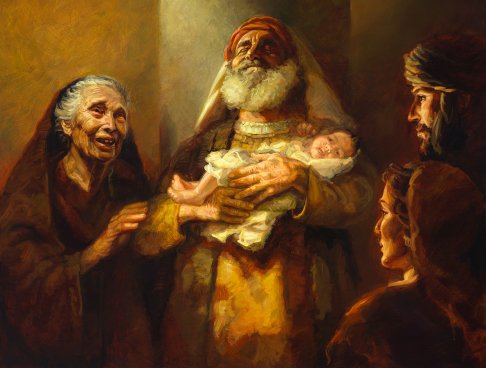 The prophetess Anna and the prophet Simeon with the baby Yah'shua
The prophetess Anna and the prophet Simeon with the baby Yah'shua
The Daughters of Simeon the Evangelist
And as we continue in the Messianic Scriptures (New Testament) we come across the four unmarried daughters of Philip of Caesarea, the Evangelist, who were prophetesses too (Ac.21:7-8)...but I am getting ahead of myself.
Similar and Different Functions of the Male and Female Prophets
So, we have explored in depth the 'honeybee' prophetess, Deborah, better called a ro'eh, 'seer' or 'wise woman' (and courageous too) and have learned that though women like her were not quite the same as the Elijah Prophets, most notably because they never did any miracles nor foretold the future, there are parallels nonetheless. That there were conventional or traditional female prophets or prophetesses mentioned in the Bible like Hannah, Abigail, Anna and the daughters of Philip is clear though none of these ministered as regular national nevi'im (prophets), i.e. they were no national or congregational leaders. The male navi (prophet) and the female naviah clearly overlapped in certain areas of ministry but were distinct and separate in others and this is carried over into the New Covenant as we shall see another time.
Conclusion
I haven't covered as much as I wanted to but we have covered a lot today. As always, so much more could be done like comparing the songs and prophecies of the female prophets. We will return to Samuel again later. As I hope you are starting to appreciate, this is both a complex, exciting and fearful subject. Next week we will look at the fellowship of the nevi'im (prophets), their 'guilds' or 'schools' and then see how they are called to the ministry. By Yahweh's grace we will complete this series by the spring and the New Year as there is so much more to unpack. Have a blessed week, all of you. Amen.
Continued in Part 3
Endnotes
[1] The anonymous editor of 1 Samuel 9 is sometimes called the 'Deuteronomist' because in the Book of Deuteronomy the instances of ro'eh being changed to 'navi' are the most numerous of all the Pentateuch books, thus perhaps indicating a later date. Thus of the Five Books of Moses, Deuteronomy could well be the most recent or later compilation of older material, a reason many scholars think it dates to the time of the Babylonian Exile. I have no definite view on this one way or the other.
[2] When in the land of Israel, it was actually a little more complicated than this as the Torah mandated following the 7-year Shemitta Cycle but as we are no longer in the land, we follow the simpler 'three thirds of a tenth' rule.
[3] Qacam, "skillful magician" (NRSV), "diviner" (ASV, NASB, NLT, NEB, RSV) or "soothsayer" (NIV) (for some bizzare reason the KJV renders this as "prudent")
Acknowledgments
[1] Harry Mowvley, Guide to Old Testament Prophecy (Lutterworth Press, Guildford & London: 1979)
[2] John Bright, A History of Israel, 3rd ed. (SCM Press, London: 1982)
[3] Bernhard W.Anderson, The Living World of the Old Testament, 2nd ed., 5th impression (Prentice Hall, Hew Jersey: 1976)
[4] E.W.Heaton, The Hebrew Kingdoms - New Clarendon Bible (OUP, Oxford: 1968)
[5] G.W.Anderson, The History and Religion of Israel - New Clarendon Bible (OUP, Oxford: 1976)
[6] Peter R.Ackroyd, Israel under Babylon and Persia - New Clarendon Bible (OUP, Oxford: 1979)
[7] D.S.Russel, The Jews from Alexander to Herod - New Clarendon Bible (OUP, Oxford: 1978)
[8] D.Winton Thomas (ed.), Documents from Old Testament Times (Harper & Row, NY: 1961)
[9] Othmar Keel, The Symbolism of the Biblical World: Ancient Near Eastern Iconography and the Book of Psalms (SPCK, London: 1978), translated from the German, Die Welt der altorientalischen Bildsymbolik und das Alte Testament: Am Veispiel der Psalmen (Köln: 1972)
[10] Clifford M.Jones (ed.), Old Testament Illustrations - The Cambridge Bible Commentary on the New English Bible (CUP, Cambridge: 1971)
[11] Matthew Black & H.H.Rowley (eds.), Peake's Commentary on the Bible (Van Nostrand Reinhold, Wokingham, England: 1982)
[12] Gerhard von Rad, Old Testament Theology, 2 vols (SCM Press, London: 1975), translated from the German, Teologie des Alten Testamentes: Die Teologie der historischen Überlieferungen Israels (München: 1957)
Further Reading
[1] Was Deborah a Ruler? Exposing the Feminist Myth


V249
|


